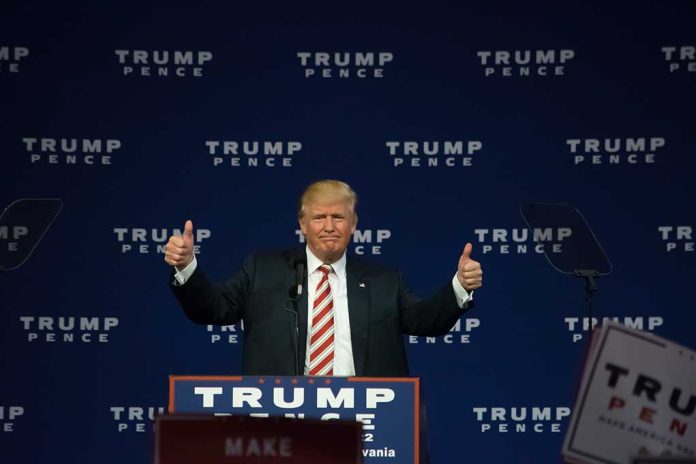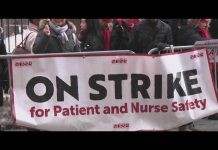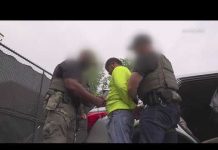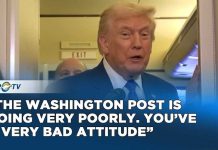
President Trump deploys 4,000 National Guards and 700 Marines to Los Angeles against fierce opposition from local authorities, intensifying his aggressive nationwide deportation campaign that has sparked violent protests in major Democratic strongholds.
Key Takeaways
- President Trump has ordered ICE to execute “the single largest Mass Deportation Program in History,” specifically targeting Democratic-run cities including Los Angeles, Chicago, and New York.
- Los Angeles has become the epicenter of confrontation, with Trump deploying 4,000 National Guards and 700 Marines despite California officials challenging the legality of this federal intervention.
- Trump aide Stephen Miller and Homeland Security Secretary Kristi Noem have demanded ICE arrest 3,000 people daily, though federal agent shortages and uncooperative local authorities hinder these ambitious goals.
- Los Angeles Mayor Karen Bass has extended curfews to manage protests while criticizing the administration for creating fear and potentially destabilizing the local economy.
- The administration has strategically paused some ICE raids in sectors like farming and hospitality after acknowledging potential negative economic impacts.
Trump’s Bold Enforcement Strategy Targets Democratic Strongholds
President Trump has dramatically escalated his immigration enforcement agenda, directly challenging Democratic leadership in major urban centers across America. The administration’s focus on cities like Los Angeles, Chicago, and New York represents a calculated effort to address what Trump describes as the “core of the Democrat Power Center.” This strategic enforcement push comes amid Trump’s broader commitment to large-scale deportation as a cornerstone of his presidency. The intensified ICE operations have specifically targeted areas where Trump has long claimed undocumented immigrants contribute to crime rates and potentially impact voting patterns.
“President Trump has ordered Immigration and Customs Enforcement (ICE) to ‘expand efforts to detain and deport’ undocumented immigrants in Democratic-run cities,” according to President Trump.
The administration has set ambitious targets for enforcement operations. Stephen Miller, a key Trump immigration advisor, and Homeland Security Secretary Kristi Noem have directed ICE to arrest approximately 3,000 individuals daily. However, practical challenges, including federal agent shortages and resistance from local law enforcement, have complicated these objectives. Despite these hurdles, the administration has managed to establish effective cooperation with local authorities in several southern states, including Texas, Florida, Georgia, North Carolina, and Virginia, primarily through “287(g)” agreements that extend immigration enforcement capabilities to local agencies.
— Jared (@zerofiveniner) July 27, 2024
Los Angeles Becomes Flashpoint for Federal-Local Authority Clash
The situation in Los Angeles has rapidly evolved into a constitutional showdown between federal and state authorities. As ICE raids triggered increasingly volatile protests, President Trump took the extraordinary step of deploying 4,000 National Guard troops and 700 Marines to maintain order, a decision made without the consent of local or state officials. This federal intervention has prompted California to initiate legal action, arguing that Trump has overstepped his constitutional authority by commandeering state military resources against the express wishes of state leadership.
Trump wrote via Truth Social he’s ordering ICE officers to ‘do all in their power to achieve the very important goal of delivering the single largest Mass Deportation Program in History.’ – President Trump.
Los Angeles Mayor Karen Bass has implemented extended curfews to prevent vandalism and looting amid the unrest while publicly criticizing the federal deportation campaign. “This administration is creating fear and potentially destabilizing our economy,” Bass stated in response to the escalating situation. Similarly, Chicago Mayor Brandon Johnson has condemned the deportation expansion, arguing that meeting arbitrary quotas incites unnecessary fear throughout immigrant communities and creates more problems than it solves.
Economic Realities Temper Enforcement in Key Industries
Despite the administration’s aggressive rhetoric, President Trump has demonstrated pragmatism by temporarily halting certain ICE operations in sectors heavily dependent on immigrant labor. This tactical pause affects industries such as farming and hospitality, reflecting the administration’s recognition of potential economic disruption from overly zealous enforcement. This calculated approach reveals the complex economic considerations underlying immigration policy, even as the administration maintains its public commitment to unprecedented deportation numbers.
“Chicago Mayor Brandon Johnson said in a statement Monday that the Trump administration’s action ‘expanding deportations to hit arbitrary quotas are unconscionable,’ adding that the move incites fear and causes ‘more problems than they solve.'” – Chicago Mayor Brandon Johnson.
President Trump has vigorously defended his enforcement strategy, particularly on Truth Social, where he has accused “Radical Democrat Politicians” of fostering violence and harassment against ICE agents. The president has framed his deportation initiative as essential for national security and has voiced unwavering support for law enforcement agencies tackling crime in urban centers. While critics continue to advocate for more balanced immigration reform, the administration remains committed to its enforcement-first approach, signaling that the tensions between federal immigration policies and local governance in Democratic strongholds will likely intensify in the coming months.














